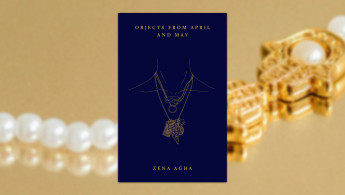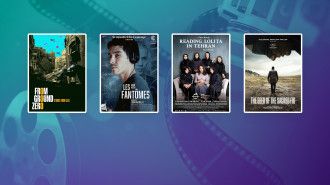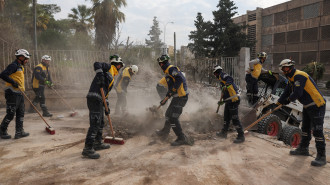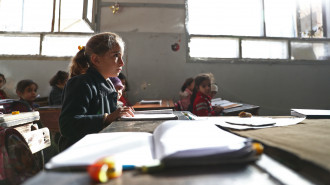Breadcrumb
Objects from April and May: Palestinian-Iraqi author Zena Agha turns loss of treasured jewellery into powerful poetry

Objects from April and May is a poetry collection by Palestinian-Iraqi author Zena Agha, inspired by an armed robbery in Oakland, California, during which her cherished gold necklaces were stolen.
These necklaces, originating from countries like Palestine, Iraq, and Syria, hold cultural significance related to gifts, treasured items, and family traditions.
"The theft felt like a deep loss, reflecting the greater losses my family has faced," Zena tells The New Arab.
Before the robbery, Zena had different plans for an upcoming book she was planning to write. She shares that she had been jotting down ideas and fragments for several months. However, the shock and devastation of the robbery turned her initial ideas into a text she felt was vital to write.
During a three-week writing residency, she had the time and space to dedicate herself to the project fully.
“It was the first time I had space and time to think since the near-death experience. Although I had planned to work on another project, this felt so urgent that it became my sole focus,” Zena explained.
The poems, written mainly in April and May of 2019, capture the period of change that followed the robbery. Some poems address the theft directly, while others explore the deeper personal and cultural significance of the stolen jewellery.
To give readers an idea of the lost treasures, the collection features beautiful illustrations of Zena’s jewellery by Hanna Stephens. One of my personal favourites is the necklace drawing from Tailsman (4), which features an outline of Palestine and is engraved with the word فلسطين (Arabic for Palestine).
In 2020, the book was a finalist for several prestigious awards, including the Alice James Book Award, the Omnidawn First/Second Book Prize, and the Philip Levine Poetry Prize.
Honest and artistic accounts
According to Zena, the primary goal of the book is to provide honest and artistic accounts of the robbery and its aftermath. Furthermore, Zena aimed to capture the emotional and psychological impact of the event, staying true to her experience.
One question that arises while reading the book is why Zena chose poetry to document her loss.
She explains that the stolen necklaces held charms and pendants from all over the world, collected at different times in her life. Poetry, with its fluidity across time and space, offered the perfect medium to honour these objects.
“It couldn’t have been in any other form,” Zena said. “I felt much freer in poetry’s form — the playfulness, the way you can break and remake words — it all felt fitting for processing the robbery.”
Throughout the book, several important themes emerge in the collection.
The central theme of the book is the significance we attach to objects, which often serve as reflections of our identities, our relationships, and our personal narratives. This theme is explicitly explored in poems like 4th May (Part Two), Note to Self, Flight B6 1415, Objects from the Golan, and the Talisman series, which serve as section breaks.
Another key theme is the connection to Palestine and how we engage with it. This is most evident in the Elegy for Return 1-4 series, which includes standalone pieces that interweave with other poems on similar subjects.
An additional, more abstract theme is the concept of mapping: the poems are arranged to reflect and mirror one another, with In Case You Need Directions (which addresses the robbery) placed centrally, and the remaining poems radiating outward and overlapping in various ways.
Cultural legacy in every charm
The collection includes 39 poems, with three of Zena's favourites being Sutter Avenue/Rutland Road, Elegy for Return No. 1, and Safe.
Sutter Avenue/Rutland Road opens the collection, mixing sadness with a feeling of freedom, setting the mood for the rest of the poems.
Elegy for Return No. 1 is deeply personal to Zena, as it's a raw and honest piece. While Safe is less often mentioned, it powerfully shows the struggle to heal after trauma and the passage of time, reflecting Zena's emotions after a robbery in short, graceful lines.
My favourite poem as a reader, and the one that stood out the most, is Talisman (1), which reads:
i. Heart-shaped. Kitsch crystals around ‘Z’. (00-19)
ii. Open hand in gold. Its palm, evil eye in blue. (0?-08) Replaced with the lemon of an eye from Mecca. Mama rebuked: Wear it louder. Lazim. It must claw the evil from every eye that sees you. (08-19)
iii. A bulbous Ayat al-Kursi. Aged seven, it was the reason for the assemblage. You know, I think it might (have) be(en) the most precious thing. (00-19)
This poem resonates with many women from the MENA region, including me, through my current jewellery collection. The necklace described, featuring a 'Z' pendant for Zena's name, resembles one I received as a gift from my family in Iraq.
Then, the same necklace, which had an evil eye pendant, reminds me of my growing collection of evil eye jewellery. Currently, I have a special evil eye necklace from Iraq, large hoops from Greece, a bracelet from Turkey, and more.
In this poem, the word "Lazim" (which translates to "essential" in Arabic) is striking. It’s a term my parents often used to emphasise the importance of wearing evil eye jewellery for protection, much like Zena’s parents did. They would heighten the seriousness of this reminder by sharing stories from back home about people who were cursed due to the evil eye. These stories have led me to carry the evil eye with me everywhere I go today.
Re-directing focus on Gaza genocide
Beyond her recent book, Zena has been recognised with fellowships from the Asian American Writers’ Workshop and the Millay Colony for the Arts.
Her short film, The Place That Is Ours, which she co-directed with Dorothy Allen-Pickard, premiered on Nowness in November 2021 and was featured in several international festivals. Additionally, her writing has been featured in prominent outlets such as The New York Times, Foreign Policy, The Nation, and NPR.
In her previous role as the US Policy Fellow for Al-Shabaka, Zena concentrated on Israeli spatial practices, climate change, and Palestinian adaptive capabilities. She was also honoured with the Kennedy Scholarship to pursue a Master’s in Middle Eastern Studies at Harvard.
Currently, Zena is a doctoral candidate at Newcastle University, where she is exploring colonial cartography in Palestine.
Looking towards the future, Zena’s focus is on community service and collective projects, driven by the ongoing genocide in Gaza.
While she hopes to continue writing and engaging in creative work, her efforts are currently directed toward more immediate concerns.
Overall, Zena’s Objects from April and May is a touching journey through loss and heritage.
After her jewellery was stolen, she channelled her pain into poetry, and this approach makes the book feel like a form of therapy.
It shows how writing about our toughest experiences can help us heal. That said, Zena’s poetry illustrates that when we healthily process our grief, it can turn into a lasting and meaningful memory.
Zainab Mehdi is The New Arab's Associate Editor and researcher specialising in governance, development, and conflict in the Middle East and North Africa region
Follow her on X: @zaiamehdi






![Anthony Blinken speech [Getty] Anthony Blinken speech [Getty]](/sites/default/files/styles/image_684x385/public/media/images/6263436E-8ACD-4D3C-9055-25A7BE79DD5A.jpg?h=d1cb525d&itok=fLHmHCRG)
 Follow the Middle East's top stories in English at The New Arab on Google News
Follow the Middle East's top stories in English at The New Arab on Google News


